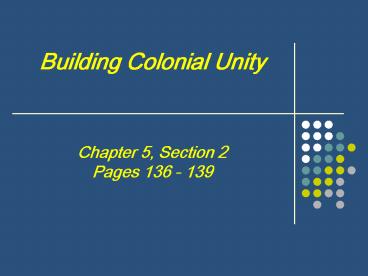Building Colonial Unity - PowerPoint PPT Presentation
1 / 14
Title:
Building Colonial Unity
Description:
They set up camp in the heart of the city. ... Townspeople wielding weapons marched through the streets toward the customhouse. ... denounce the British tea monopoly. ... – PowerPoint PPT presentation
Number of Views:87
Avg rating:3.0/5.0
Title: Building Colonial Unity
1
Building Colonial Unity
- Chapter 5, Section 2 Pages 136 - 139
2
Did You Know?
- There were two Boston tea parties.
- The first one, staged by the Sons of Liberty
disguised - as Mohawks, occurred on December 16, 1773, when
- they dumped 342 chests of tea into Boston Harbor.
- They were protesting the 3 cents per pound tax on
tea. - The second one repeated the protest on March 7,
1774. - Both tea parties cost the British, in present-day
- currency, around 3 million.
3
Trouble in Boston
- Parliament sent two regiments of troops
(redcoats) - to Boston.
- They set up camp in the heart of the city.
- These soldiers were in some cases rude and
violent toward the colonists. - Because Boston resented the presence of the
- soldiers, fighting broke out between the redcoats
and - Bostonians and continued throughout the next
year.
4
The Boston Massacre
- The Boston Massacre (March 5, 1770) was a result
- of the heated tension between the redcoats and
the - Bostonians.
- Townspeople wielding weapons marched through the
streets toward the customhouse. - The redcoats fired, killing five colonists.
Among the dead was Crispus Attucks, an African
American dockworker.
5
The Boston Massacre
Paul Revere
6
Aftermath of the Boston Massacre
- The Boston Massacre led colonists to call for
- stronger boycotts of British goods.
- Colonial leaders used the killings as propaganda
- against the British.
- Parliament repealed the Townshend Acts except
- the tax on tea.
7
Colonial Resistance
- Some colonial leaders still called for resistance
to - British rule.
- In 1772, Samuel Adams revived the committee of
correspondence in Boston to circulate colonists
grievances against Britain. - Other colonies began committees of correspondence
that brought together protesters opposed to
British measures.
8
Tea Act of 1773
- Parliament passed the Tea Act of 1773 to save the
- British East India Company from going under.
- This act gave the East India Company a favorable
advantage over colonial merchants because it was
able to ship its extra tea to the colonies
without paying most of the tea taxes. - Because its tea was sold directly to the
shopkeepers at a low price and bypassed colonial
merchants, the tea from the East India Company
was cheaper than any other tea.
9
Colonial Boycotts
- The colonialist again boycotted British goods to
- denounce the British tea monopoly.
- The Daughters of Liberty marched through town and
burned the East India Companys tea. - Colonialists in Boston and Philadelphia planned
to stop the companys ships from unloading. In
all colonial ports, except Boston, colonists
forced the companys ships to return to Britain.
10
The Boston Tea Party
- In Boston Harbor in December 1773, the royal
- governor order the tea unloaded.
- At midnight on December 16, the Boston Sons of
- Liberty disguised as Mohawks boarded three
British - ships and threw 342 chests of tea overboard.
11
The Boston Tea Party
12
British Reaction
- The king and Parliament vowed to punish Boston
- and the people of Massachusetts for using the
- Boston Tea Party to resist British rule.
- The Coercive Acts were passed.
- These acts closed Boston Harbor until the
colonists paid for the ruined tea. - Closing the harbor prevented Bostonians from
receiving food and other supplies.
13
The Intolerable Acts
- The laws enacted by the Coercive Act also banned
- town meetings and forced Bostonians to house
- British soldiers in their homes.
- The colonists renamed these acts the Intolerable
- Acts.
14
Discussion Questions
- Why did Britain repeal the Townshend Acts?
- How did the Boston Tea Party challenge British
rule?































